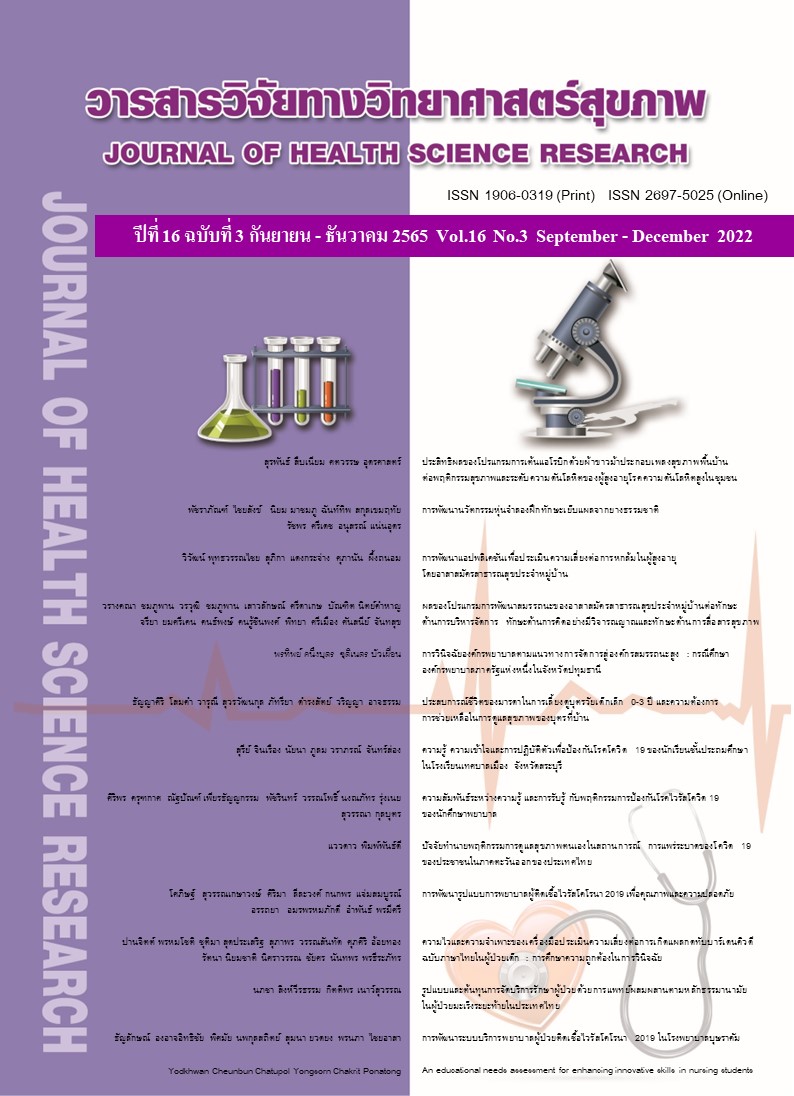ความสัมพันธ์ระหว่างความรู้ และการรับรู้ กับพฤติกรรมการป้องกัน โรคไวรัสโควิด 19 ของนักศึกษาพยาบาล
Main Article Content
บทคัดย่อ
บทนำ : การป้องกันโรคไวรัสโควิด 19 ในสถาบันการศึกษาเป็นสิ่งสำคัญ นักศึกษาควรมีความรู้ที่ถูกต้องและรับรู้โรคไวรัสโควิด 19 อย่างเหมาะสมเพื่อป้องกันการเกิดโรคอย่างมีประสิทธิภาพ
วัตถุประสงค์การวิจัย : เพื่อศึกษาความสัมพันธ์ระหว่างความรู้ และการรับรู้ กับพฤติกรรมการป้องกันโรคไวรัสโควิด 19 ของนักศึกษาพยาบาล
วิธีการวิจัย : การวิจัยเชิงบรรยาย ตัวอย่าง คือ นักศึกษาพยาบาล จำนวน 293 คน เครื่องมือที่ใช้การวิจัยประกอบด้วย 1) แบบทดสอบความรู้ ตรวจสอบเครื่องมือโดยผู้เชี่ยวชาญได้ค่า IOC เท่ากับ 0.67-1.00 หาค่าความเชื่อมั่นด้วย KR20 คัดเลือกข้อคำถามที่มีค่าอำนาจจำแนกและความยากง่าย ตามเกณฑ์ 2) แบบสอบถามการรับรู้และพฤติกรรมการป้องกันโรคไวรัสโควิด 19 ได้ค่า I-CVI เท่ากับ .67 ค่า S-CVI เท่ากับ .96 ค่าสัมประสิทธิ์แอลฟาของครอนบาค เท่ากับ .86 และ .91 ตามลำดับ วิเคราะห์ข้อมูลด้วยสถิติเชิงพรรณนา และสัมประสิทธิ์สหสัมพันธ์แบบสเปียร์แมน
ผลการวิจัย : พบว่า ความรู้ไม่มีความสัมพันธ์กับพฤติกรรมการป้องกันโรคไวรัสโควิด 19 แต่การรับรู้มีความสัมพันธ์กับพฤติกรรมการป้องกันโรคไวรัสโควิด 19 อย่างมีนัยสำคัญทางสถิติ (r = .517, p<.01) เมื่อพิจารณาเป็นรายด้าน พบว่า การรับรู้ความสามารถของตน การรับรู้ถึงประโยชน์ของการป้องกันโรค การรับรู้โอกาสเสี่ยง และการรับรู้ความรุนแรง มีความสัมพันธ์กับพฤติกรรมการป้องกันโรคไวรัสโควิด 19 อย่างมีนัยสำคัญทางสถิติ (r = .664, .546, .525 และ .515 และ p<.01 ตามลำดับ)
สรุปผล : การรับรู้มีความสัมพันธ์กับพฤติกรรมการป้องกันโรคไวรัสโควิด 19 ดั้งนั้นการจัดกิจกรรมเสริมหลักสูตรเพื่อเสริมสร้างความตระหนักในการรับรู้จะช่วยในการเฝ้าระวังและป้องกันโรคอย่างเหมาะสมต่อไป
Downloads
Article Details

อนุญาตภายใต้เงื่อนไข Creative Commons Attribution-NonCommercial-NoDerivatives 4.0 International License.
บทความที่ได้รับการตีพิมพ์เป็นลิขสิทธิ์ของวิทยาลัยพยาบาลบรมราชชนนี จังหวัดนนทบุรี
ข้อความที่ปรากฏในบทความแต่ละเรื่องในวารสารวิชาการเล่มนี้เป็นความคิดเห็นส่วนตัวของผู้เขียนแต่ละท่านไม่เกี่ยวข้องกับวิทยาลัยพยาบาลบรมราชชนนี จังหวัดนนทบุรี และคณาจารย์ท่านอื่น ในวิทยาลัยฯ แต่อย่างใด ความรับผิดชอบองค์ประกอบทั้งหมดของบทความแต่ละเรื่องเป็นของผู้เขียนแต่ละท่าน หากมีความผิดพลาดใด ๆ ผู้เขียนแต่ละท่านจะรับผิดชอบบทความของตนเองแต่ผู้เดียว
เอกสารอ้างอิง
Department of microbiology, faculty of medicine siriraj hospital, mahidol university. Novel coronavirus 2019 (2019-nCoV). [Internet]. 2020 [cited 2020 Jan 30]; Availiable from: https://www.si.mahidol.ac.th /sidoctor/e-pl/articledetail.asp?id=1410. (in Thai).
World Health Organization. Coronavirus disease (COVID-19) pandemic. [Internet]. 2020. [cited 2022 Jan 30]; Availiable from: https://www.who.int/emergencies/diseases/ novel-coronavirus-2019/situation-reports.
Laemthaisong J, Toonsiri C, Homsin P. Factor influencing on preventive behaviors of respiratory tract infections among caregivers of preschool aged children in childcare center, Bangkok metropolitan administration. Journal of Public Health Nursing. 2019;33(1):1-19. (in Thai).
Rosenstock IM, Strecher VJ, Becker MH. Social learning theory and the health belief model. Health Edu Q. 1988;15(2): 175-83. doi: 10.1177/109019818801500203.
Best JW, Kahn JV. Research in education. 10th ed. Boston: Pearson education; 2006.
Silanoi L, Chindapraser K. The use of rating scale in quantitative research on social sciences, humanities, hotel and tourism study. Journal of Management Science, Ubon Ratchathani University. 2019;8(15):112-26. (in Thai).
Pommapun B. Techniques for data interpreting for using correlation and regression in research. STOU Education Journal. 2018;11(1):32-45. (in Thai).
Rungnoei N, Dittabunjong P, Klinhom P, Krutakart S, Gettong N. Factors predicting monitoring and preventive behaviors of COVID-19 among nursing students. Princess of Naradhiwas University Journal. 2022;14(2):17-37. (in Thai).
Albaqawi HM, Alquwez N, Balay-Odao E, Bajet JB, Alabdulaziz H, Alsolami F, Cruz JP. Nursing students, perceptions, knowledge, and preventive behaviors toward COVID-19: A multi-university study. Front Public Health. 2020;8(8):1-9.
doi:10.3389/fpubh.2020.573390
Saranrittichai K. Health literacy: Concepts, theories and applications. 2nd ed. Khon Kaen: Khonkaen printing; 2021. (in Thai).
Chaiyapan M. Human behavioral development. Bankok: Chulalongkorn university; 2019. (in Thai).
Phetphum C. Health behavior: Concepts, theories and applications. 3rd ed. Phitsanulok: Narasuan university publishing house; 2019. (in Thai).
Joychoo N, Pinyopasakul W, Chareonkitkarn V. Relationships among age, perceived benefits of health behaviors, perceived barriers of health behaviors and health behaviors in patients with ischemic stroke. Ramathibodi Nursing Journal. 2014;20(2):236-48. (in Thai).
Chidnayee S, Tachawarakorn K, Poosook K, Wiangnak K, Khrutkamchon K, Naksuan K, et al. Knowledge and preventive behaviors towardsthe Covid-19 among nursing students in Boromarajonani College of Nursing, Chiang Mai. Journal of Nursing and Public Health Research. 2021;1(3):60-71. (in Thai).
Sanyod R, Trisayaluk T, Sookchai P, Sroikham K, Insura K, Asunee NAJ. Relationships between knowledge and
attitude to preventive behavior against Corona Virus (COVID 19) in nursing students.The 13th NPRU National Academic Conference; 8th - 9 th July 2021; Nakhon Pathom Rajabhat University. Nakhon Pathom Thailand; 2021. p 1230-6. (in Thai).
Melizza N, Kurnia AD, Masruroh NL, Al Busthomy Rofi i AY, Prasetyo YB. Knowledge and perception and its relationship with preventive behaviors of COVID-19. Gac Med Caracas. 2022;130 (Supl1):265–70. doi: 10.47307/GMC.202 2.130.s1.43.
Chamno P. The study of knowledge, perception and disease prevention control behaviors level on Dengue Hemorrhagic Fever of public health volunteers case study: Phran Kratai district, Kamphaeng Phet province. Disease Control Journal. 2016;42(2):138-50. (in Thai).
Rodniam J, Saetiaw S, Jantaweemuang W. Perceived benefits, perceived barriers, perceived self-efficacy and health promoting behaviors, and health status of nursing students. Nursing Journal of the Ministry of Public Health. 2014;23(3): 88-97. (in Thai).


